World Geography And Politics Daily News | 21 Jul 2023

Views (55)
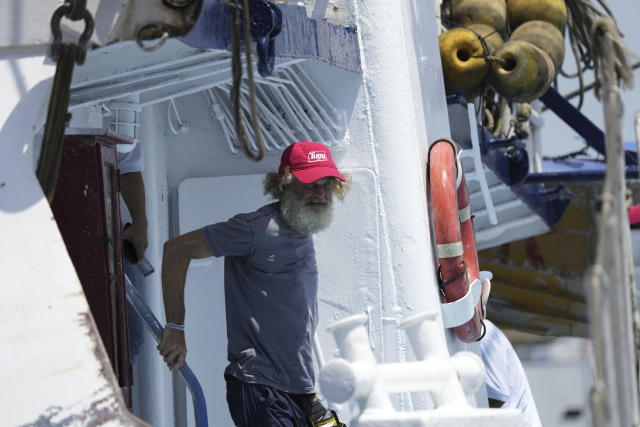
US plans second summit with Pacific island leaders in September
WASHINGTON (Reuters) -U.S. President Joe Biden will host a second summit with leaders of Pacific island nations in September, Joseph Yun, the U.S. official responsible to negotiations with three key Pacific island states said on Thursday. U.S. officials have said the summit is expected to take place around the time of the U.N. General Assembly meetings in New York in September. Biden's national security adviser, Jake Sullivan, said in May Biden would arrange another summit of Pacific island lead
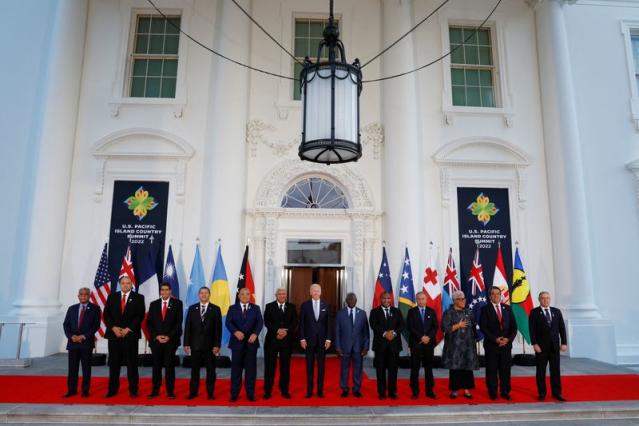
WASHINGTON (Reuters) -U.S. President Joe Biden will host a second summit with leaders of Pacific island nations in September, Joseph Yun, the U.S. official responsible to negotiations with three key Pacific island states said on Thursday.
U.S. officials have said the summit is expected to take place around the time of the U.N. General Assembly meetings in New York in September.
Biden's national security adviser, Jake Sullivan, said in May Biden would arrange another summit of Pacific island leaders this year after the disappointment caused by his cancellation of a visit to Papua New Guinea due to the domestic debt ceiling crisis. Biden hosted a first summit with the leaders last year.
"He has committed (to) holding a second summit in September this year," Yun told an event hosted by the Heritage Foundation think tank.
Yun stressed the importance of the U.S. Congress approving new funding for the three Pacific Island countries he has been negotiating with by the end of the fiscal year on Sept. 30, given China's strategic ambitions in the region.
Palau, Micronesia and the Marshall Islands all have what are known as Compacts of Free Association (COFAs) with the United States, under which the U.S. has responsibility for their defense and provides economic assistance, while gaining exclusive access to huge strategic swathes of the Pacific.
In May, Yun said he had finalized terms with Micronesia and Palau to renew their COFAs and hoped do so with the Marshall Islands in coming weeks.
However, the foreign minister of the Marshall Islands called last week for more U.S. money to deal with the legacy of massive U.S. nuclear testing to enable the renewal of its agreement, the economic terms of which expire on Sept. 30.
"I'm very hopeful that we can reach an agreement in a reasonably short time - weeks," Yun said.
Under MOUs agreed this year, the U.S. will commit a total of $7.1 billion over 20 years to the three nations, subject to congressional approval.
Yun has proposed that Congress approve the total amount agreed in the MOUs by Sept. 30, even without a final agreement with the Marshall Islands, warning that it would be damaging to U.S. credibility and a big blow for the islands if that did not happen.
(Reporting by David Brunnstrom and Trevor Hunnicutt; Editing by Stephen Coates)
Family behind Russia’s deadly Lancet drones own £1.5 million London flat
The son of the man responsible for Russia’s deadly Lancet drones co-owns a £1.5 million London flat and works for the United Nations Institute for Disarmament.
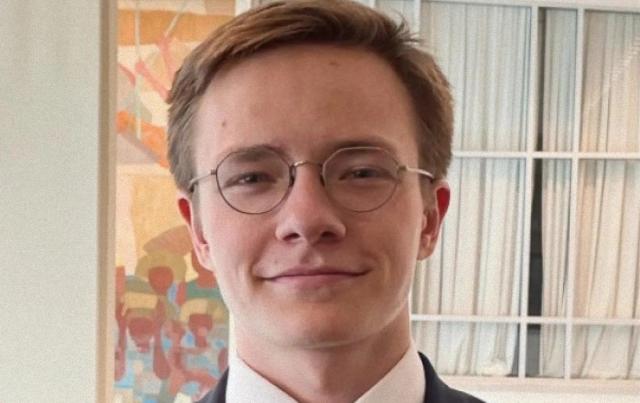
Engineer Alexander Zakharov has been involved in the development and production of drones on behalf of the Russian ministry of defence for over 15 years.
While he arms Russian troops, his wife, Svetlana, and son, Lavrentii, own a property, near the Home Office, that lies a stone’s throw from the Houses of Parliament in Westminster.
According to publicly available listings, the flat, purchased in 2018, is 1,000 square feet, has three bedrooms, a kitchen-diner and an outdoor terrace with views of Big Ben and the London Eye.
The building is Grade II-listed and was once requisitioned by the secret service during the Second World War.
The apartment is co-owned by Zakharov’s youngest son, who has lived outside of Russia since 2015, from the age of 16, studying at University College of London and the London School of Economics.
Since graduating with a master’s degree in conflict studies, the 24-year-old has held various positions at the United Nations in New York, Rome and Geneva.
He currently works as a “graduate professional” at the organisation’s Institute for Disarmament Research, where he studies “strengthening weapons and ammunition management” and “de-mining and humanitarian access”, according to his profile page on its website.
There is no suggestion that he is involved in the family business, CST LLC, which was sanctioned by the British Government in February for its role in arming the Russian military.
However, Russian media outlets reported that Zakharov’s wife, as well as his elder son, Nikita and daughter Maria are involved in the firm.
While the drone manufacturer has been targeted by the UK, there are no punitive measures against the Zakharov family.
Lancet drones first appeared on the battlefields of Syria, used by Russian troops supporting dictator Bashar al-Assad’s regime in the fight against Islamic terrorists.
Moscow has since ramped up its investment in their production for use in Ukraine, with Kyiv’s forces describing the weapon as a major thorn in their side.
Between 2022 and 2023, Russia’s ministry of defence has purchased 5.3 billion roubles (£45 million) worth of drones from CST LLC, according to a report by the Russian news outlet Important Stories.
The single-use unmanned aerial vehicles are often referred to as kamikaze drones or loitering munitions because they explode on impact with their target.
The latest version of the device has a 30-mile range and is capable of destroying vehicles and equipment many times its size and price.
Russian television often airs stories showcasing the Lancet drones, demonstrating their effectiveness against Ukrainian targets.
They’ve reportedly been able to destroy German Leopard 2 tanks and French Caesar self-propelled howitzers, and is now the favoured weapon for Russian counter-battery fire.
Zakharov told a recent broadcast on the state-controlled Rossiya 1 channel that he needed a Segway to move around the newest factory churning out the weapons.
The Telegraph has approached Lavrentii Zakharov for comment.
Last May, the anti-corruption foundation led by Russian opposition figure Alexei Navalny discovered that the family of Boris Obsnovo, the chief executive of Tactical Missiles Corporation JSC, makers of cruise missiles used by Moscow to target Ukrainian civilians, owns property worth €7 million (£6 million) in the Czech Republic.
At last week’s Nato summit in Vilnius, Petr Pavel, the Czech president, said there was a “legal problem” in targeting Obsnovo’s assets.
“So far, there is no legislation that would allow the Czech Republic to either confiscate [his property] or expel him from the Czech Republic. We are looking for ways to solve this problem,” Mr Pavel said.
Frustrated by Biden, China Courts ‘Old Friends’ Like Kissinger
The red carpet welcome in Beijing for Henry Kissinger, the 100-year-old former secretary of state, included China’s top leader, Xi Jinping, telling him that “the Chinese people will always remember you.” It featured praise from China’s top diplomat for his wisdom. And it involved a meeting with the Chinese defense minister, who has rebuffed multiple requests to engage with his American counterpart. China’s enthusiastic reception for Kissinger this week is the latest example of how Beijing is rea

The red carpet welcome in Beijing for Henry Kissinger, the 100-year-old former secretary of state, included China’s top leader, Xi Jinping, telling him that “the Chinese people will always remember you.” It featured praise from China’s top diplomat for his wisdom. And it involved a meeting with the Chinese defense minister, who has rebuffed multiple requests to engage with his American counterpart.
China’s enthusiastic reception for Kissinger this week is the latest example of how Beijing is reaching outside official diplomatic channels to broaden the reach of its message and try to influence Washington’s thinking. Beijing has turned to those it deems more aligned with its position as it has become more skeptical toward, and at times openly frustrated with, the Biden administration.
With the visit by Kissinger, whom Xi and other officials called an “old friend,” Beijing has sought to emphasize cooperation and mutual respect between the powers. With visits by business leaders like Bill Gates — also dubbed an old friend by Xi — and Elon Musk, China has tried to highlight the long-standing economic relationship and the perils of untangling global supply chains.
Such efforts may become increasingly significant as Beijing pushes back against what it sees as the Biden administration’s efforts to contain China geopolitically, militarily and technologically. China is also watching as Republicans and Democrats unite in wanting to remain tough on Beijing, and a U.S. presidential election approaches in which candidates will likely be more critical of China.
“This looks very much like a deliberate Chinese strategy” to court individuals who might help change opinions in Washington, said Dennis Wilder, former head of China analysis at the CIA. “The Chinese are energizing those with a vested interest in the Chinese economy and the overall relationship.”
After several months of a deep chill, the two countries have started reengaging on issues like trade and climate change. But progress has been limited, with President Joe Biden’s climate envoy, John Kerry, coming out of talks this week in China with no new agreements, and Beijing arguing that troubles in the relationship hinder its cooperation with Washington on fighting global warming.
While the meetings may have succeeded in building a “floor” in the relationship, tensions remain high. China wants the United States to lift restrictions on technology, curb its support for Taiwan, and stop what Beijing sees as a containment strategy centered on building security ties with U.S. allies and partners around Asia. Ties could fray further if the Biden administration imposes new restrictions on American investments in Chinese companies involved in quantum computing, artificial intelligence and semiconductors.
Zhu Feng, a professor of international relations at Nanjing University, said Kissinger’s visit pointed to “Beijing’s anxiety about how to influence and persuade American policy elites to reduce their strategic suppression of China,” at a time when voices like his were increasingly rare in Washington.
Beijing often evokes the time when Kissinger served as secretary of state and helped pave the way for a historic visit to China in 1972 by President Richard Nixon, as an example of a golden era in bilateral relations. That trip led to the establishment of diplomatic ties between Washington and Communist-ruled China seven years later.
As relations have soured in recent years, Chinese officials have said U.S. officials should learn from Kissinger and his pro-engagement stance.
To drive that point again, China highlighted the historical significance of the venue for Xi’s meeting with Kissinger on Thursday. Chinese officials chose Villa No. 5 of the Diaoyutai State Guesthouse, the same building where half a century earlier Kissinger had met Zhou Enlai, China’s premier at the time.
“China and the United States’ relations will forever be linked to the name ‘Kissinger,’” Xi said in a video released by CCTV, the state broadcaster, as the two men sat side by side in plush cream-colored armchairs. “I express my deep respect to you.”
In an official summary of the meeting, released by Chinese state media, Xi was quoted as saying: “I hope you and people of insight in the United States will continue to play a constructive role in bringing China-U.S. relations back to the right track.”
Wang Yi, China’s top foreign affairs official, a day earlier had told Kissinger that U.S. policy needed “Kissinger-style diplomatic wisdom, and Nixon-style political bravery,” according to China’s Foreign Ministry.
China has also been courting American business leaders. Aside from Gates and Musk, Apple CEO Tim Cook and JPMorgan Chase CEO Jamie Dimon have visited China this year — some given the kind of high-level meetings with Chinese officials that senior officials from foreign nations also get. The visits by business leaders are also an opportunity for China to send a message domestically about foreign confidence in the economy, which has faced an uncertain recovery.
During his trip to Beijing in March, Cook took selfies with admirers at an Apple store and attended a government development forum — then seen as an important signal as China was just emerging from three years of strict coronavirus restrictions.
Two months later, Musk traveled to China and met with senior ministers and Shanghai’s top leader. In Chinese media reports, Musk, the head of Tesla and Twitter, was hailed as a proponent of open trade between the United States and China.
“Musk’s trip to China showed U.S. businesses’ firm confidence in the Chinese market despite ‘decoupling’ noises from some Western politicians,” said the Global Times, a Communist Party tabloid.
With these meetings, Xi appears to be trying to highlight the importance of business ties between the two nations, and signal that growing tensions in the relationship could jeopardize those links.
That messaging has become even more important for Beijing to emphasize after Chinese officials raided the offices or interrogated the staff of American consulting firms such as Bain & Co., spooking many foreign businesses, said Yun Sun, director of the China program at the Stimson Center in Washington.
“China overall wants to retain foreign investors, and the ones they have been appealing to are large high-tech companies that may still see the appeal of the Chinese market,” Sun said.
“The Chinese do believe these business leaders enjoy more freedom to act outside the political correctness,” she said. “But another piece of it is that China wants to showcase that cooperation with China, and following Beijing’s rules, will be rewarding.”
c.2023 The New York Times Company
Putin is openly worrying about revolutions, saying Russia has already hit its 'limit'
In an unrelated meeting, Putin suddenly brought up revolutions, repeating his argument that Russia exhausted how many times its citizens can revolt.

Putin offered up an unexpected and unusual appeal to history to discourage revolution this week.
He said that Russia reached its "limit" on revolutions last century.
The Russian leader often leverages history, though not always accurately, to his various interests.
Russia's leader has said this before, and is saying it again: Russia has reached its "limit" on revolutions.
On Wednesday, Russian President Vladimir Putin continued "to display his knowledge of Russian history at odd moments, this time appearing to warn against the possibility of revolution in Russia," the Institute for the Study of War reported in an update.
Responding to the mention of a recent mayovka event at a meeting, Putin offered insight into where his thoughts are these days.
The term mayovka has been linked to both innocent springtime activities and revolutionary dissidents, and Putin seemed to zero in on the latter, expressing a desire to avoid a revolution.
"The limit on revolutions in our country has already been exhausted in the last century," said Putin, referring to a timeframe which includes the collapse of the Soviet Union, a significant development he has called the 20th century's "greatest geopolitical tragedy."
The Russian president is a man of history, not always accurate history, but history nonetheless. It shows up constantly in his public addresses. Time and time again, the world has seen Putin make appeals to history that serve his purpose or at least try to.
This aspect of his character has also been visible in his revisionist justifications for the war in Ukraine, the Kremlin's comparisons of the battles for Bakhmut and Stalingrad, and more recently, his observations about how the Wagner mutiny echoed the revolution in 1917.
"This is a stab in the back of our country and our people," Putin said on June 24 after his longtime ally Yevgeny Prigozhin launched an armed mutiny against the ministry of defense.
The revolt, which came as Russia was facing a Ukrainian counteroffensive threatening its hold on captured territory, was shocking and might have even led to violence in the Russian capital of Moscow had it not been externally defused.
"Such a blow was dealt to Russia in 1917, when the country was waging the First World War," Putin said, "but victory was stolen from it."
"We won't let this happen again," Putin, who has had an exceptionally tight grip on control, said during this shocking test of the Kremlin's authority.
Putin has ruled over Russia for twenty-three years in one way or another and has signed a law allowing him to remain there for thirteen more years.
"Russia," Putin said at the time," exhausted its limit on revolutions back in the 20th century. We don't want any more revolutions. We want the evolutionary development of our society and state. I hope that this will be the case."
UN chief condemns Russian attacks on Ukraine ports
U.N. Secretary-General Antonio Guterres strongly condemned on Thursday Russian attacks on Ukraine's Black Sea ports and warned the "destruction of civilian infrastructure may constitute a violation of international humanitarian law." "These attacks are also having an impact well beyond Ukraine," said U.N. spokesperson Stephane Dujarric. Russia has jolted world grain markets with an escalation in the Black Sea, mounting a third-straight night of air strikes on Ukrainian ports and issuing a threat
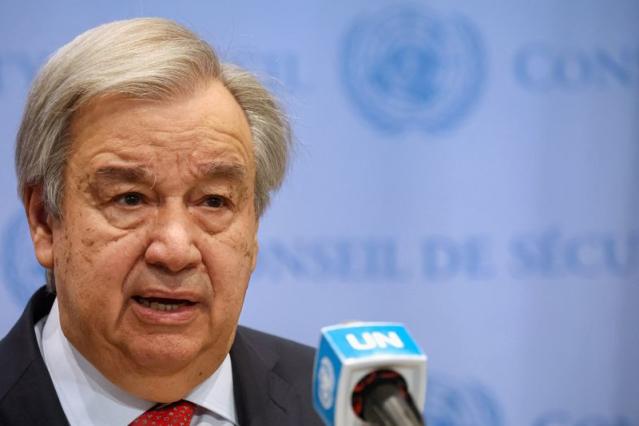
By Michelle Nichols
UNITED NATIONS (Reuters) - U.N. Secretary-General Antonio Guterres strongly condemned on Thursday Russian attacks on Ukraine's Black Sea ports and warned the "destruction of civilian infrastructure may constitute a violation of international humanitarian law."
"These attacks are also having an impact well beyond Ukraine," said U.N. spokesperson Stephane Dujarric. "We are already seeing the negative effect on global wheat and corn prices which hurts everyone, but especially vulnerable people in the global south."
Russia has jolted world grain markets with an escalation in the Black Sea, mounting a third-straight night of air strikes on Ukrainian ports and issuing a threat against Ukraine-bound vessels.
Kyiv responded by announcing similar measures against vessels bound for Russia or Russian-occupied Ukrainian territory.
Moscow has described the port attacks as revenge for a Ukrainian strike on Russia's bridge to Crimea on Monday.
The moves came just days after Russia quit a deal - brokered by the United Nations and Turkey - that allowed the safe Black Sea export of Ukraine grain for the past year.
The U.N. Security Council will meet on Friday over the "humanitarian consequences" of Russia's withdrawal from the Black Sea deal, Britain's U.N mission said on Thursday.
Russia's withdrawal on Monday also effectively ended a pact between the U.N. and Moscow, in which U.N. officials agreed to help Russian food and fertilizer exports reach world markets.
Under that agreement, the U.N. has said Moscow was no longer fulfilling a pledge to "facilitate the unimpeded export of food, sunflower oil, and fertilizers" from Ukrainian Black Sea Ports.
The United Nations said on Thursday that Russia's attacks on Ukrainian ports also contradict that commitment.
"The Secretary-General will not relent in his efforts to ensure that Ukrainian and Russian food and fertilizer are available on international markets as part of his ongoing efforts to fight global hunger and ensure stable food prices for consumers everywhere," Dujarric said.
(Reporting by Michelle Nichols; editing by Kanishka Singh)
Australian castaway recounts comfort he felt adrift at sea, thanks to meditation, swimming and dog
He quit his corporate job and moved to Mexico to pursue his dream of sailing solo across the ocean. Australian Timothy Shaddock, 54, bought his 30-foot catamaran two years ago in the Mexican Pacific resort of Puerto Vallarta. “Of course, living on a boat and sailing on a boat is two different things and that was more of a challenge,” Shaddock told The Associated Press Wednesday after stepping onto land for the first time in months.
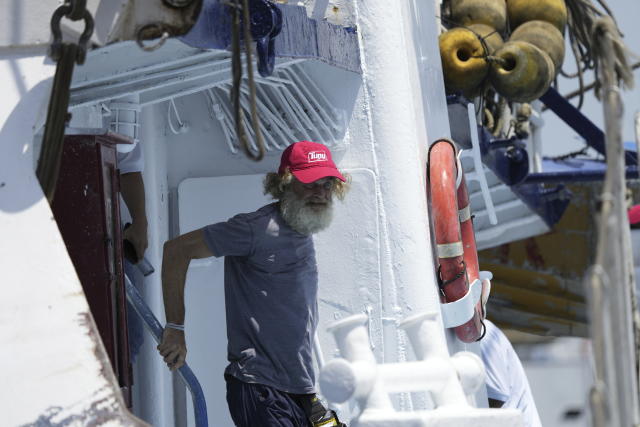
MANZANILLO, Mexico (AP) — He quit his corporate job and moved to Mexico to pursue his dream of sailing solo across the ocean.
Australian Timothy Shaddock, 54, bought his 30-foot catamaran two years ago in the Mexican Pacific resort of Puerto Vallarta. He needed a place to live and he liked the isolation.
“Of course, living on a boat and sailing on a boat is two different things and that was more of a challenge,” Shaddock told The Associated Press Wednesday after stepping onto land for the first time in months.
As his training ground Shaddock chose the Sea of Cortez, a narrow finger of water between the Baja California Peninsula and the Mexican mainland.
“I was aware and the only preparation that you can really do is take the boat out to sea and test the boat at sea,” Shaddock said. He would take short journeys, noting what was working on the boat and what wasn’t, but was conscious that, in late April, hurricane season was coming.
“It was either now or I could not really wait one more year,” he said.
“There’s one moment where you’re going and it’s most likely that you will not stop,” Shaddock said. “And I remember that day very well, because once you hit the Pacific, the wind and the current is behind you, it’s one way, you cannot come back.”
He sailed out of the Sea of Cortez and into the Pacific under a full moon. He thinks it was early May, though the dates are vague in his memory.
“It was very good sailing on that full moon,” he recalled. “The boat was moving fast. It was a clear night. The winds were strong. I was amazed how the boat moved and it felt so good to sail under that moon and perfect direction. It was so easy to make the decision. I wanted to keep sailing.”
When he arrived in Mexico at the beginning of the pandemic in June 2020, he initially lived in San Miguel de Allende, a charming colonial town in central Mexico popular with foreign tourists.
There, he met Bella, a black and brown stray dog, who became his constant companion for the next three years, despite occasional efforts to find her a suitable home on land.
Shaddock and Bella were a few weeks into their journey when a storm changed everything in an instant.
“The current changes direction. So if you’re drifting you’re suddenly drifting in a circle. And the wind, it’s changing all the time,” Shaddock described. “The waves are moving in many directions and it’s hypnotizing, you sort of suddenly feel like you’re in a whirlpool.”
He lost his sail, all of his electronics, including navigational equipment, and his ability to cook food.
Days became a battle against fatigue: fixing things on the boat, fishing, capturing rainwater. He was overwhelmed by the fear that the next day he might be too exhausted, too weak.
Shaddock found comfort in meditation, swimming in the ocean and writing in a journal.
Keeping Bella fed and content gave him added purpose. The two subsisted on raw fish and rainwater.
Shaddock thought he probably would die at sea until he heard a helicopter on July 12. Its pilot, Andrés Zamorano, was the first person Shaddock had seen in months and has since become a friend. Zamorano had taken off from the tuna boat María Delia in search of schools of the fish.
They were 1,200 miles from the nearest land.
Zamorano believes a moral obligation Shaddock felt to keep Bella alive helped them both survive.
Aboard the María Delia, Shaddock and Bella were showered with attention and first aid. Crew members spoiled Bella and treated the blisters on her paws.
“He would come up to the bridge every day whenever he wanted and we would drink coffee, talk,” the boat’s captain, Oscar Meza, said.
Two days after the rescue, the boat found a huge school of tuna, allowing it to fill its hold and turn for its home port of Manzanillo.
“The best moment was being with the dolphins when they catch all the tuna,” Shaddock said. “You hear their sounds, you see them move and you feel their magic. That is the magic of freedom and it is the truth of why we are alive.”
Stepping onto land Tuesday for the first time in months was both incredibly welcome and a bit uncomfortable for someone who had grown quite accustomed to being alone.
Everyone asked about Bella and then felt deflated when told Shaddock had decided to give her to an animal lover on the crew of the María Delia.
“The Australian embassy really made that decision for me,” Shaddock said later, noting that his country has very strict quarantine laws.
For now, Shaddock plans to return soon to Australia to see his parents, sister and his daughter. He still loves the sea, but said he was not sure how soon he would again go out of sight of land. There was still an air of uncertainty in his voice.
“My daughter she might come here, get me and bring me home,” he said. “Maybe. She wants to come.”
0 Likes
